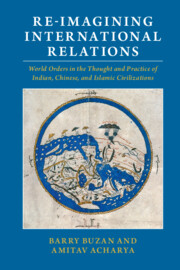Social Darwinism was a pathbreaker in the history of Chinese international thought. In this study, we explore the hitherto sparsely discussed process of the reception of social Darwinism in China, which led to a fundamental transformation in Chinese thinking about the international order and the position of China vis-à-vis Western powers. Drawing on the work of three leaders of that intellectual transformation – Yan Fu, Kang Youwei, and Liang Qichao – we analyse issues such as the struggle for existence and survival, national and racial competition, and statism. We demonstrate how the three aforementioned thinkers modified the original Darwinist thought, enriching it with voluntarism and radical collectivism, all in order for the emerging set of ideas to suit China’s historically determined needs. Overall, our analysis contributes to both the history of International Relations thought in China and the broader debate on the globalisation of IR theory and IR knowledge production.
